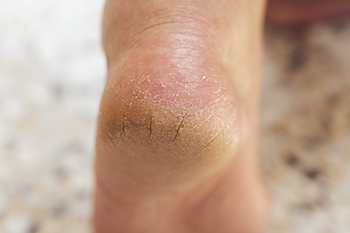
Heel fissures, which are cracks in the skin on your heels, can be more than just a cosmetic concern. Heel fissures often lead to discomfort and may even pose a risk of painful infections and skin damage. Diabetics are particularly susceptible to heel fissures because of the effects of damaged nerves in the feet that hinder natural moisturization. Dry skin is the most common cause associated with heel fissures, but various factors may contribute to their formation. Among them are eczema, athlete's foot, and environmental conditions. Additionally, medical conditions such as hypothyroidism, psoriasis, and rheumatoid arthritis can be factors. Any condition that results in the thickening of tissue or affects sweat production can heighten the risk. To tackle heel fissures, consider applying thick moisturizers twice a day. For more stubborn cases, a podiatrist may prescribe the use of products containing alpha hydroxy acids, salicylic acids, or urea to help shed dead skin cells. Anyone with heel fissures is wise to take this condition seriously. For help, it is suggested that you make an appointment with a podiatrist for an exam and appropriate treatment options.
Cracked heels are unsightly and can cause further damage to your shoes and feet. If you have any concerns, contact one of our podiatrists from Westland Foot & Ankle Specialists, P.C.. Our doctors can provide the care you need to keep you pain-free and on your feet.
Cracked Heels
Cracked heels appear unappealing and can make it harder for you walk around in sandals. Aside from looking unpleasant, cracked heels can also tear stockings, socks, and wear out your shoes. There are several methods to help restore a cracked heel and prevent further damage.
How Do You Get Them?
Dry skin is the number one culprit in creating cracked heels. Many athletes, walkers, joggers, and even swimmers suffer from cracked heels. Age and skin oil production play a role to getting cracked heels as well.
Promote Healing
Over the counter medicines can help, especially for those that need instant relief or who suffer from chronic dry feet.
Wear Socks – Wearing socks with medicated creams helps lock in moisture.
Moisturizers – Applying both day and night will help alleviate dryness which causes cracking.
Pumice Stones – These exfoliate and remove dead skin, which allows for smoother moisturizer application and better absorption into the skin.
Change in Diet
Eating healthy with a well-balanced diet will give the skin a fresh and radiant look. Your body responds to the kinds of food you ingest. Omega-3 fatty acids and zinc supplements can also revitalize skin tissue.
Most importantly, seek professional help if unsure how to proceed in treating cracked heels. A podiatrist will help you with any questions or information needed.
If you have any questions, please feel free to contact our office located in Westland, MI. . We offer the newest diagnostic and treatment technologies for all your foot care needs.
